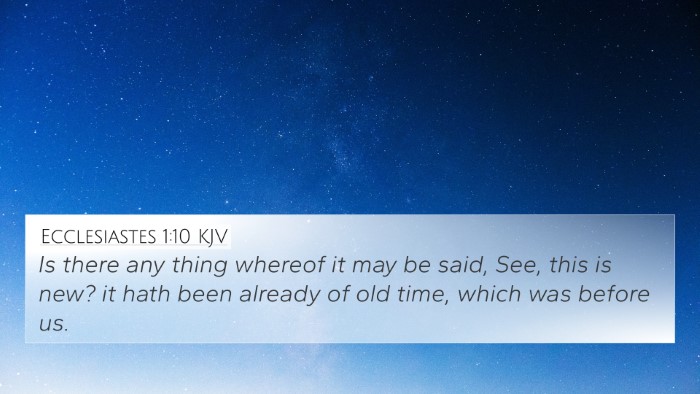Understanding Proverbs 20:14
Verse (Proverbs 20:14): "It is bad, it is bad," says the buyer; but when he goes away, then he boasts.
This verse offers insight into the human tendency towards deception in the marketplace, particularly highlighting the way buyers often downplay the value of what they purchase.
Summary of Meaning
The essence of this proverb warns against dishonesty in trade. It reflects the idea that buyers may feign disinterest or contempt for a product in order to drive down the price, only to leave and express pride in their 'victory' of securing a better deal. This verse illustrates the broader theme of integrity in transactions and the importance of honesty in relationships, both commercial and personal.
Insights from Public Domain Commentaries
-
Matthew Henry:
Henry notes that the buyer’s action of disparaging a price is more than mere negotiation; it reflects moral behavior. He underscores the idea that allowing greed to dictate our actions leads to larger ethical issues in all dealings.
-
Albert Barnes:
Barnes explains that this proverb reveals the dual nature of the buyer—a person who appears humble but in reality is negotiating with cunning. His commentary emphasizes the necessity for integrity, not just in business, but in all aspects of life.
-
Adam Clarke:
Clarke discusses the implications of boasting post-purchase, portraying it as a common flaw in human behavior. He also relates this tendency to a broader cultural context, wherein individuals often trump up their own successes at others' expense.
Related Biblical Cross-References
- Proverbs 11:1: "A false balance is abomination to the LORD: but a just weight is his delight." - This verse emphasizes the importance of fairness in trade, connecting to the themes of honesty in Proverbs 20:14.
- 1 Thessalonians 4:6: "That no man go beyond and defraud his brother in any matter..." - This New Testament cross-reference continues the theme of ethical behavior in relationships, warning against deceit.
- James 5:4: "Behold, the hire of the laborers who have reaped down your fields, which is of you kept back by fraud, cries..." - Highlighting the consequences of dishonesty, this links to the overarching principle of integrity discussed in Proverbs.
- Proverbs 16:8: "Better is a little with righteousness than great revenues without right." - This verse parallels the notion of valuing integrity over mere financial gain.
- Matthew 7:12: "Therefore all things whatsoever ye would that men should do to you, do ye even so to them..." - This scripture establishes the moral foundation for treating others fairly, reinforcing the message of honesty.
- Luke 16:10: "He that is faithful in that which is least is faithful also in much..." - A reminder that integrity in small dealings is foundational for larger responsibilities.
- Proverbs 22:1: "A good name is rather to be chosen than great riches..." - This verse relates to the value of reputation over monetary gain, echoing the message of Proverbs 20:14.
Thematic Connections
The primary themes of Proverbs 20:14 resonate with broader inquiries into commerce ethics, the moral implications of dishonesty, and the longstanding biblical teachings on integrity. Cross-referencing various scriptures enhances our understanding of the consistent narrative throughout the Bible that upholds honesty as a key virtue.
Tools for Cross-Referencing
For anyone looking to deepen their understanding through Bible cross-referencing, consider utilizing tools such as:
- Bible Concordance
- Bible Cross-Reference Guide
- Comprehensive Bible Cross-Reference Materials
- Bible Reference Resources
Conclusion
Proverbs 20:14 serves as a critical reminder of the ethical responsibilities that come with trade and interactions. By considering the provided cross-references, readers can gain a deeper understanding of biblical principles that instruct us in the midst of complex human behaviors and societal norms.





